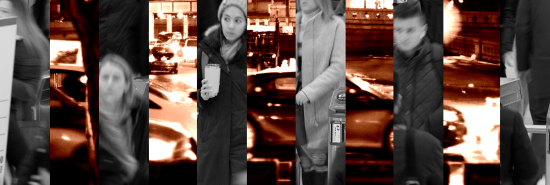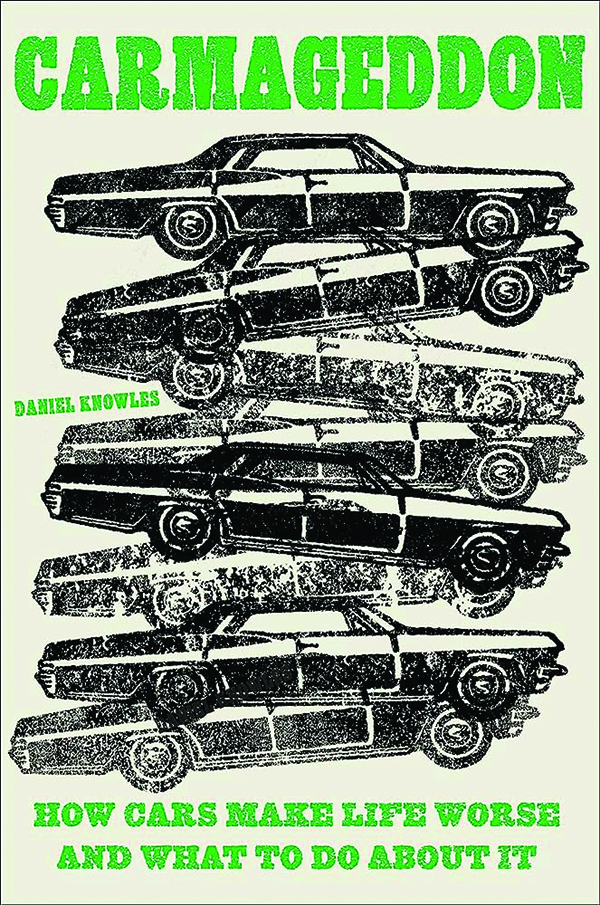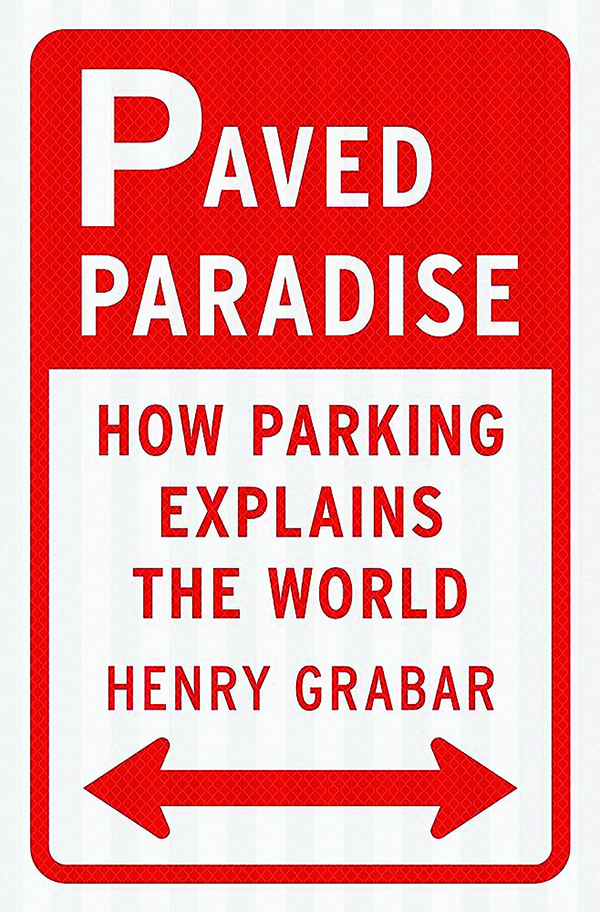
The tame souls behind books arguing against cars
Jack Baruth
There are eight kittens running around my little rural property as you read this. Three of them are utterly feral, as is their mother, and I see them mostly as ephemeral moments of motion between trees or through the grass. The other five were brought into my barn by their mother shortly after birth. You can handle them, and sometimes they will consent to sit on your lap — but any attempt to shut them up in the barn, even during bad weather, is intolerable to them. They are wild by design and by dint of having just a little freedom, which is all it takes to build the desire for more of it. If you want true house cats that will not even consider walking through an open door to the outside, you have to break them more or less at birth and never let them see an alternative to your (admittedly loving) incarceration until they are too old to change.

Daniel Knowles is just such a house cat. The author of Carmageddon: How Cars Make Life Worse And What To Do About It failed to get his driver’s license as a teenager, noting that he found driving “simultaneously stressful and boring.” A decade later, while working for the Economist, he was finally forced by circumstance to get his license, but the damage was already done. Knowles had already fallen into the mindset that finds the densest of megacities to be, in his own words, “the richest, most innovative places on Earth. They are the places with the highest quality of life … the happiest people. … People are desperate to live in them.” He dismisses the hundreds of thousands of people who flee New York every year by noting how quickly others replace them, without considering how the same might be said of everything from Scientology to the Wagner Group.
THE SELECTED WRITING OF ONE OF AMERICA’S BEST BLACK SPORTSWRITERS
Knowles lives in a gentrified Chicago neighborhood: “Most of the houses are beautiful, solid brick buildings, with grand porches, high ceilings, and huge windows.” He can walk anywhere he wants and is almost indecently satisfied with his life. To his credit, he’d like everyone else to live the same way. But there’s an enemy out there that prevents it, and it has four wheels.
Carmageddon reads, at times, like a self-conscious parody of Reddit-level slacktivist dogma. Everything wrong in the world is either the fault of the automobile, racism, or a Wonder Twins pairing of the two. “The decline of Detroit,” he intones, “has many causes. Dysfunctional government is one, racism another, corruption a third. But all of them are linked to the automobile.” He leans heavily on the apocryphal tale about Robert Moses building bridges to keep black families away from the beach and then ascribes the demonstrated preference of most human beings for private transportation to a sinister and all-too-familiar motivation: “In your car, you do not have to share space with somebody of another color.”

The principled and classically liberal opposition of Daniel Patrick Moynihan to congestion pricing in New York City during the ’70s is shaded thus: “Moynihan, a senator who, a decade before, had argued that it was family breakdown causing problems in African American society, rather than the ghettos created by the combination of racism and automobiles.” At one point in Carmageddon, Knowles appears dangerously close to making a cogent point about COVID-19: “Outdoor air pollution kills half as many people each year as coronavirus did … yet we shut down our economies to prevent COVID-19 from spreading.” Ah, but his eventual resolution is not that COVID-19 was handled in a hysterical fashion, but rather that we should shut down the rest of our economy to stop the evil cars. Perhaps his most delightfully fanciful conclusion is that people left cities during the ’70s and ’80s because of, you guessed it, pollution from the leaded gasoline used in urban cars. As someone who was born in New York City, I would suggest that the rapidity with which cars were stolen there during the ’70s was perhaps a larger factor in people wanting to leave than whatever came out of the tailpipes of those stolen cars, but perhaps that is naive.
Knowles finds the most solid ground in his anti-automotive crusade when he discusses the remarkable and rather shocking effects of minimum-parking regulations on the urban landscape. In this, he relies on a better and more thoughtful book, Donald Shoup’s famous The High Cost Of Free Parking. Shoup has spent a lifetime detailing the inanities of parking-obsessed civil planning, but his oft-updated book runs north of 800 pages and is often tiresomely academic. Henry Grabar’s much shorter and livelier Paved Paradise: How Parking Explains The World, released about a month before Carmageddon, contains pretty much all the useful and true information you could get from Shoup’s tome and Knowles’s polemic.
Grabar, as well, lives a charmed life in Chicago, but he has no affection for the anti-car agitation of fortunate walkable-city gentrifiers: “I come to bury that rhetoric, not to praise it.” And he is willing to consider both sides of a question: “Are real estate values high [in New York City and other dense cities] because they are dense, vibrant environments? Or are they dense, vibrant environments because real estate values are too high to sustain surface parking lots?”
Grabar, relying on his own research in addition to that of Shoup, makes a solid case that there is simply too much parking, sold to motorists at a fraction of its actual cost. His most interesting point is that street parking tends to be cheaper and more convenient than garage parking, leading to nontrivial extra traffic on streets, more unpleasant interactions, more agitation, and largely empty parking garages. And, below a certain price level, people will simply store their cars on the street. He tells a story of a woman who has lost considerable weight since finding the best possible street spot to park her car long-term because she is unwilling to move the car from that spot to go to a restaurant or even a grocery store.
The reader ends Paved Paradise largely convinced that there should be a more data-driven and thoughtful approach to the provision and allocation of parking pretty much everywhere from Chicago to Dallas. This is much better than the feeling one has upon finishing Carmageddon, which is not dissimilar to how a pedestrian in a walkable community might feel after escaping the clutches of a particularly manic and aggressive street preacher. Yet both books share a common, and critical, flaw: They treat the desire for private transportation in one’s automobile as an inexplicable and irrational evil, a modern equivalent to the Mayan obsession with human sacrifice.
Call it house-cat blindness, perhaps. Knowles and Grabar can see the evils of the car, which are admittedly myriad and diverse, but they have no genuine feeling for why people might willingly subject themselves to those evils. Knowles thinks it is an expression of structural racism, while Grabar regards it as a sort of childish irrationality based on laziness and unwillingness to walk anywhere.
CLICK HERE TO READ MORE FROM THE WASHINGTON EXAMINER
Yet the average person understands the appeal of the car instantly. It does not just “represent” choice and freedom, as these books grudgingly admit. The automobile is choice and freedom. Some freedoms are minor: the ability to stay 20 minutes longer somewhere without falling afoul of ticketed and timed mass transit or to load up an extra bag of mulch in one’s pickup truck just in case. Others are fundamental: the right to travel without the permission and knowledge of a transit authority or public utility.
The privately owned automobile is an environmental, financial, and physical menace. Yet it also offers something that has been impossible for 99.9% of human history: the ability to cover a thousand miles in a day without the approval of a third party. This freedom, once tasted and enjoyed, is impossible to forget, the same way that my partially wild kittens will never willingly accept a house where every door is shut. “In no way am I unusual,” Knowles pleads, detailing his unwillingness to drive himself. “There are millions of stories like mine.” Of course there are! The meek, like the poor, will be with us always.
Jack Baruth was born in Brooklyn, New York, and lives in Ohio. He is a pro-am race car driver and a former columnist for Road and Track and Hagerty magazines who writes the Avoidable Contact Forever newsletter.
